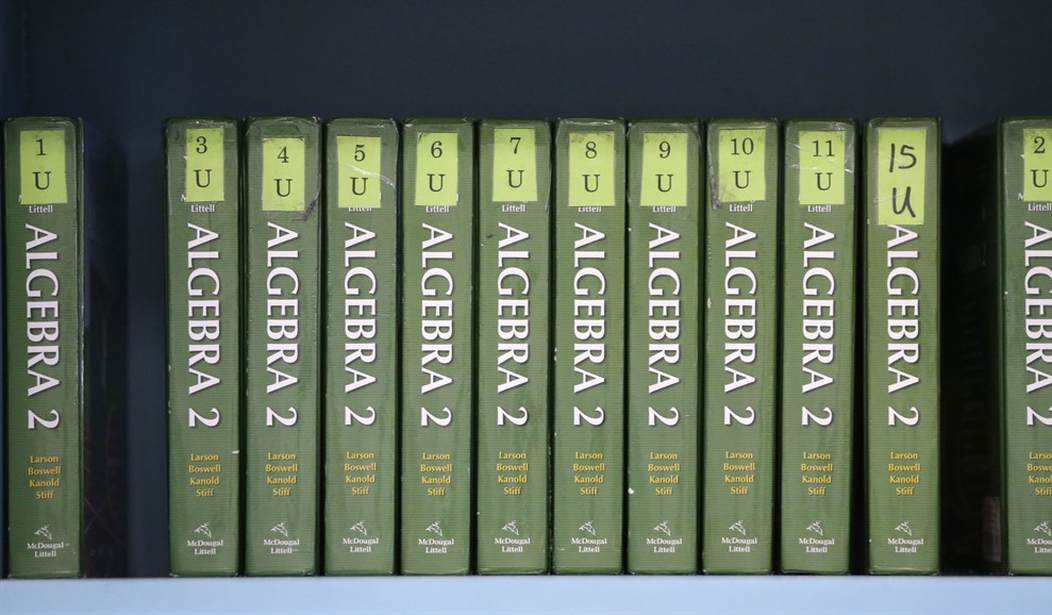Books can and should be written about Democrats' efforts to screw up education for kids. I'm not just talking about the pandemic shutdown that set kids back by a year or more and which resulted in lots of kids leaving school and never returning. I'm also talking about efforts to replace phonics, to get rid of standardized testing and to do away with tracking.
Today, I'm going to write about the de-tracking effort which began in San Francisco as a way to fix the racial achievement gap between white and black students. The goal was to stop dividing kids into groups or tracks based on their performance and instead push everyone into taking the same classes at the same time. More specifically, the educators were convinced that doing away with 8th grade algebra for some kids would result in everyone performing more equally. So in 2014 the city did away with 8th grade algebra.
Advocates for the new California math guidelines say “de-tracking,” or mixing together students of varying academic performance, can help all students, particularly those who would have languished in lower-level classes. It can also unravel racial segregation inside schools. Almost everywhere, White and Asian American students are more likely to be placed in higher tracks, with Black and Latino students more likely to be placed in lower tracks.
The goal from the start was equity which made it very easy to determine a few years later that de-tracking had failed.
A much-debated change to math course sequencing in the San Francisco schools designed to reduce racial inequities has increased Black students’ access to some higher-level courses.
But racial inequities at the most advanced levels of high school math remain largely unchanged, according to a new analysis released March 20…
“Closing those racial and ethnic gaps in advanced math coursetaking was a central stated goal of this reform. And it seems pretty clear that in that regard, it failed on its own terms,” Dee said.
But while de-tracking failed to generate any equity, it was a pain in the rear for students who wanted to take calculus by their senior year of high school. By denying them the chance to take Algebra in Middle School, San Francisco forced them to take an entire year of math during summer school or to double up and take two math classes during a single year of high school. Holding back the high achievers didn't help the low achievers but it did harm the high achievers.
So eventually a group of parents in San Francisco sued the school district and the Superintendent promised to look at the issue. That was in 2023. Eventually, a non-binding ballot initiative was passed (by 81%) calling on the district to return Algebra to 8th grade classrooms. The SFUSD board voted to do it in early 2024, but algebra would only return to a third of Middle Schools the following year. Why only a third? Because someone decided returning to what worked required a pilot program.
Now here we are in the middle of the 2025-2026 school year and SF schools still haven't got their act together.
Courtney Helland wants her seventh-grade daughter to take Algebra 1 next year. That shouldn’t be a problem.
Math teachers at James Denman Middle School, where Helland heads the PTA, have offered to teach Algebra 1, and the San Francisco Unified School District’s board pledged to offer the class to every eighth grader starting in the 2026-27 school year. Voters even weighed in last year, with an overwhelming 81% in support.
Yet if the next school year is anything like this one, Helland’s daughter won’t be taking algebra at Denman. Instead, the district can promise only a sped-up summer version or an online class without a live instructor.
That is because Denman and roughly two-thirds of San Francisco’s K-8 and middle schools are not offering on-site algebra. Meanwhile, other public middle schools are in the second year of offering Algebra 1 — which was standard for eighth graders for more than a decade — as a normal class.
Rori Abernathy has taught at Denman for 11 years on the front lines of the “math wars,” the ideological battle over which classes should be offered to which students. She has a harsh review of the online, self-directed version of Algebra 1 available at her school. “It should just be killed with a stick,” she said.
Sundar Sarangan, whose son completed Denman’s online class last year, described it as “literally a set of videos” that the boy “painstakingly had to complete.”
So you can take Algebra in 8th grade but it might just be a series of videos with no actual teacher. This is still making this much harder for students than it should be. It's almost like the advanced students are being punished. It's not just about getting to calculus either. Algebra is one of the subjects that will feature on SAT tests. Students looking to go to a top tier school will still need to take the SAT and getting a sped up or video based version of the class may not result in the best results.
The bottom line is that even after all the evidence shows de-tracking didn't work, some administrators are still dragging their feet about reversing the terrible decision they made back in 2014. Instead, they are considering a plan to leave algebra for 9th grade or one that would push everyone to take it in 8th grade. That would still keep all the students together and hide the existence of the achievement gap, which seems to be the only thing that matters.
Editor’s Note: Do you enjoy Hot Air's conservative reporting that takes on the radical left and woke media? Support our work so that we can continue to bring you the truth.
Join Hot Air VIP and use the promo code FIGHT to get 60% off your VIP membership!








Join the conversation as a VIP Member